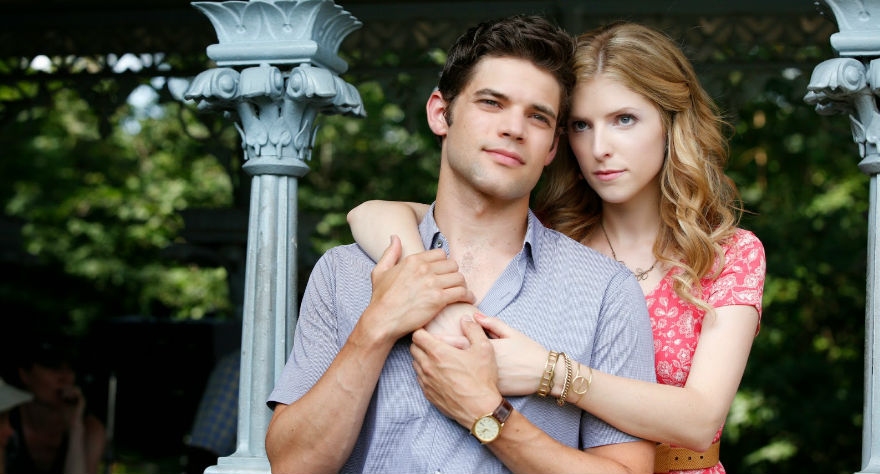
Kendrick kills it again in LaGravenese's doomed-romance musical.

Kendrick kills it again in LaGravenese's doomed-romance musical.
An approachable musical about two lovers out of sync, The Last 5 Years is yet another stage for Anna Kendrick to stand on and blow us away, and that in itself makes the film notable. She’s spectacular as usual, and at this point in her career, her movie-musical schtick isn’t tiresome in the least. Her partner in song is Jeremy Jordan, best known for his stint on the short-lived ABC series Smash, a handsome young man with an elastic voice and white-bread appeal. The problem with this Richard LaGravenese adaptation of Jason Robert Brown’s 2002 stage show is that the asynchrony that exists between its characters extends to the actors playing them, making the film feel uneven for the wrong reasons. It’s still enjoyable, though, a modest production that seems geared toward the most casual of musical fans, much like Stuart Murdoch’s 2014 indie-pop gem God Help the Girl.
Made on a shoestring, the film charts the blossoming and eventual implosion of a half-decade-long romance in an imaginative way, shattering the lovers’ timeline and rearranging the shards like a piece of post-modernist art. From aspiring musical-theater actress Cathy’s (Kendrick) perspective, we see the relationship play out in reverse; the film opens with her singing a lover’s lament, alone in the couple’s New York brownstone. “Jamie is over and Jamie is gone / Jamie’s decided it’s time to move on” she sings in the forlorn first number, “Still Hurting”. We then switch over to Jamie (Jordan), a burgeoning novelist whose side of the story starts, traditionally, at beginning of the relationship, when he and Cathy were madly enamored and felt giddy just to breathe the same air. From there the film alternates between the two, their chronologies intersecting on their wedding day in Central Park and then continuing on in opposite directions.
In the stage production, we only ever see Cathy and Jamie together when the timelines intersect (a gimmick accomplished through clever blocking and lighting), but the film sees Kendrick and Jordan share the screen quite a bit, for practical reasons. The high-concept minimalism of the live show poetically reinforces the story’s theme of romantic dissonance, but the film doesn’t appear to suffer from utilizing real locations, elaborate sets, and sweeping camera moves. The cinematography isn’t particularly impressive, but it’s evocative enough to help bolster whatever emotions the songs project.
As the film’s quick 90 minutes fly by we learn in glimpses that the doomed relationship started in earnest with Jamie taking a big risk: after a life-changing phone call from Random House, he promptly calls Cathy in a fit of elation and decides they’re moving in together. We know the relationship ends in flames, however, and it’s slowly revealed that the wedge responsible for the couple’s split is success itself. Jamie’s career soars, his publishing deal with Random House launching him into the company of dignitaries and socialites who he’s obligated to schmooze with at expensive parties. Struggling actress Cathy, who suffers through botched big-city auditions and never ascends beyond summer stock theatre, gets thrown to the wayside as the career-minded Jamie becomes more and more bewitched by the allure of the high life (and beautiful groupies).
Kendrick kicks ass as usual, singing with range and fluidity and emoting only as big or as small as is appropriate for each number. She’s spot-effing-on, and it’s sort of astonishing how in-control she always is, even during tricky numbers like the wrenching opening song. “I’m a Part of That”, a gorgeous ballad of anxiety and doubt, is her best moment, and perhaps the film’s as well. Jordan’s a great singer, too, but he lacks Kendrick’s discipline; his performance is always dialed one notch too loud. (When he sings the adoring “Shiksa Goddess”, he’s so theatrical it’s borderline-aggravating, and it doesn’t help that it’s the first thing we hear him sing.) His enthusiasm is usually cloying, while Kendrick’s is consistently toothsome. Their acting styles simply don’t match up very well, an ironic complication considering the material.
The songs sound more colloquial than your run-of-the-mill musical, focused more on cadence and naturalism than melody and hooks. “Schmuel”, a jaunty story-time ditty Jamie uses to lift Cathy’s drooping spirits, is the bounciest, most divergent song (and Jordan’s shining moment), and represents Brown’s songwriting at its most playful. Brown’s stated that The Last 5 Years is an intensely personal and semi-autobiographical piece, which is interesting when you consider the authenticity and depth of the Cathy character. LaGravenese’s interpretation of the material is pretty straightforward and unremarkable, but his ability to keep the see-sawing timeline organized and easy to follow is impressive and crucial to the success of the film.
Jamie comes off like an arrogant dick (the movie opening with Cathy so utterly heartbroken at his hands probably has a lot to do with it), and Jordan doesn’t have the chops to imbue him with any deeper complexity. We naturally gravitate to Cathy’s underdog status (and Kendrick’s irresistible charm), however, which makes the film perhaps more asymmetrical than intended. The Last 5 Years is enjoyable all the way through notwithstanding, with pleasant (if largely forgettable) songs and a unique storytelling structure that keeps you on your toes. Kendrick’s the real reason to check it out, though, and rabid devotees of the gifted Pitch Perfect sweetheart will only fall deeper in love with their idol.